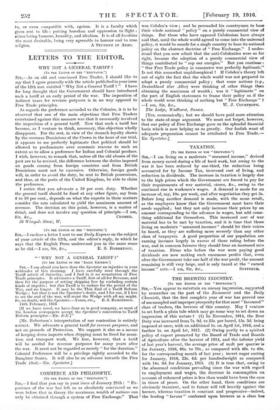COMMERCE AND PHILOSOPHY.
[To THE EDITOX OF THE " SPECTATOR.")
Sin,—I find that you say in your issue of January 29th : " Ex- perience of the war has left us as absolutely convinced as we were before that in theory the maximum wealth of nations can only be obtained through a system of Free Exchange." That
was Cobden's view ; and he persuaded his countrymen to base their whole national " policY " on a purely commercial view of things. But those who have opposed Cobdenism have always said that, until the whole world agreed to come into the universal policy, it would be unsafe for a single country to base its national policy on the abstract doctrine of " Free Exchange."- I under- stand that you now admit that the anti-Cobdenites were so far right, because the adoption of a purely commercial view of things contributed to " sap our energies." But you continue : " Our Free Trade policy in commerce was perfectly legitimate." Is not this somewhat unphilosophical ? If Cobden's theory left out of sight the fact that the whole world was not prepared to adopt a purely commercial policy ; that some nations (e.g., Deutschland fiber Alles) were thinking of other things than obtaining the maximum of wealth ; was it " legitimate " on the part of English statesmen to frame their policy as. if the whole world were thinking of nothing but " Free Exchange " ?
[Yes, economically; but wo should have paid more attention to the state-of-siege argument. Wo must not forget, however, that our policy of Free Exchange gave us the splendid financial basis which is now helping us so greatly. Our foolish want of adequate preparation cannot be attributed to Free Trade.— ED. Spectator.]


































 Previous page
Previous page